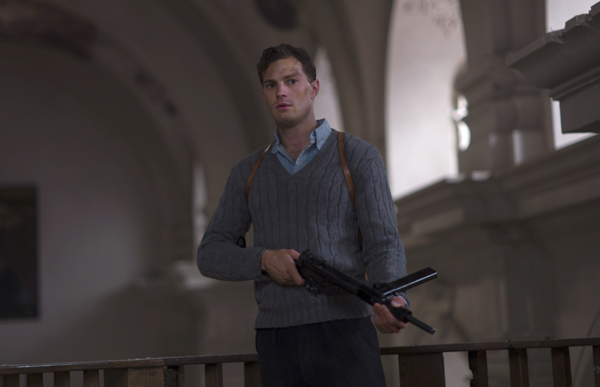This World War II spy thriller is an odd study in historical adaptation, proving how strict adherence to fact can add gravity and, at the same time, drain vitality from a film. While tales of heroes pitted against Nazi cruelty have an enormity that fiction can’t match, history is also murky, convoluted, and typically lacking in clear themes or engaging structure. Anthropoid takes those weaknesses with its strengths, resulting in a thought-provoking film that, unfortunately, leaves a viewer unsatisfied.
Jan Kubis (Jamie Dornan) and Josef Gabcik (Cillian Murphy), two Czech operatives working for the government-in-exile in London, parachute into Nazi-occupied Czechoslovakia with minimal supplies and months-old intel. Their mission is to contact the local resistance forces—or what’s left of them—and assassinate Reinhard Heydrich, a high-ranking official known as “the Butcher of Prague.” Right at the outset, the film’s “trust no one” atmosphere is established by two woodsman who, after breaking bread with the operatives, immediately try to turn them in. Jan and Josef’s situation only becomes direr from there.
However, despite the constant tension and sky-high stakes, much of the film is spent waiting. Waiting to find out Heydrich’s movement patterns, waiting for more orders from Britain, waiting for the girlfriends the men pick up as cover. This gives Jan and Josef plenty of time to earnestly discuss the wisdom of their mission. What good would assassinating Heydrich do? Wouldn’t he just be replaced by another sociopath? Wouldn’t such an action lead to brutal reprisals, the slaughtering of thousands of innocent citizens? The answers to these questions are a definite “yes,” but no one is able to articulate the worth of the mission in spite of the staggering costs. They’re all just following orders. It makes for a bleak story, in which there’s no correct move, no hope to be found.
All of this is startlingly close to what actually happened. Sean Ellis, who directed and cowrote the film, shows a remarkable obsession with historical detail. Even the specific methods used in one of the many torture scenes are lifted straight from fact. There’s an extra layer of horror here; not only is the scene utterly grotesque, but these events happened to actual human beings. The real-life counterpart to the person we see on screen really did hear the crunch of the cyanide capsule as he bit into it.
But, as mentioned earlier, this is also the film’s Achilles’ heel. The actions and motivations become muddled as the plot overstays its welcome, beholden more to history than to the notion of compelling storytelling. Long after the assassination is done, we linger with the characters as they scramble through city streets, dodging the repercussions of their actions until the bitter end. It culminates in a thrilling action scene, but it’s not enough; as the credits roll, we’re left with little more than a body count. What did our protagonists accomplish? Was the sacrifice of all those lives worth it? Or were they just pawns in a ploy to legitimize the government-in-exile? Anthropoid can’t answer these questions. Leave that to the history books.

















Leave A Comment